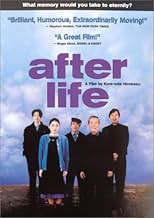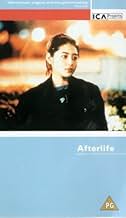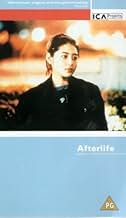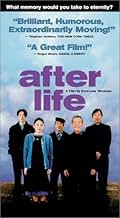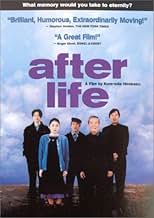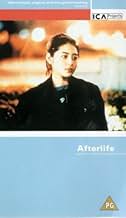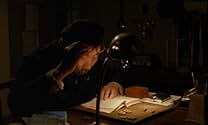CALIFICACIÓN DE IMDb
7.6/10
15 k
TU CALIFICACIÓN
Después de morir, las personas tienen una semana para elegir un solo recuerdo y conservarlo por toda la eternidad.Después de morir, las personas tienen una semana para elegir un solo recuerdo y conservarlo por toda la eternidad.Después de morir, las personas tienen una semana para elegir un solo recuerdo y conservarlo por toda la eternidad.
- Dirección
- Guionista
- Elenco
- Premios
- 7 premios ganados y 8 nominaciones en total
Arata Iura
- Takashi Mochizuki, counselor
- (as Arata)
- Dirección
- Guionista
- Todo el elenco y el equipo
- Producción, taquilla y más en IMDbPro
Opiniones destacadas
Afterlife is without a doubt one of the greatest Japanese films I've ever seen. Visually it is truly stunning. Kore Eda is known for his own obsession with lighting and his skill for casting shadows and beams of white light are second to none. Combined with an innovative, creative and enjoyable story that takes on a slightly supernatural docu-drama and at the same time is set in a dull, down and out halfway house between Earth(life) and heaven(afterlife). Fascinating scenes take place as the deceased have one week to decide on a single memory from their lifetime that they can keep for all eternity. He also includes elements of documentary with talking head scenes of the deceased talking about their memories. Kore Eda throws around some extremely interesting ideas and themes on life and human emotions for our memories and he genuinely makes you think about what he's said once you've finished watching.
This is a film that not everyone would enjoy due to its slow moving pace, mood orientated lighting and partly improvised script, but it is a creative masterpiece that is definitely worthy of high praise and attention.
This is a film that not everyone would enjoy due to its slow moving pace, mood orientated lighting and partly improvised script, but it is a creative masterpiece that is definitely worthy of high praise and attention.
This was a perfect film for watching on a quiet Sunday morning. It made me reflect on my own life, and realize that I would probably be one of the counselors in the afterlife.
It was brilliantly written and directed and one of the most innovative stories I have seen on screen. After death, you spend a week in a way-station to reflect on your life and take one memory with you. It is not an easy process as I discovered.
I was interested in the fact that some people can remember all the way back to the womb. Picking a happy memory before I was an adult is almost impossible for me, so I cannot imagine going back that far. Most people remember only to age three or four.
I was fascinated with the man who wanted to leave behind some evidence of his existence. One man could not remember any happy memories in his 70+ years, so he had to sit through video tapes, one for each year of his life, to help him. It seems that there was a connection with one of the counselors and this played out in an unusual way at the end. Choosing your best memory as the fact that you were someone else's best memory and that you made one person happy.
Most of us fall into the category expressed by one man. "I had a so-so education, a so-so job, a so-so marriage, and a so-so retirement." How do you pick a happy or important memory from that? I also liked one man's response when he picked his memory after lamenting that most of the memories of his life were bad. After being told he would forget all the bad memories, he exclaimed, "That truly is heaven." An unusual film that will be in my memory for a long time.
It was brilliantly written and directed and one of the most innovative stories I have seen on screen. After death, you spend a week in a way-station to reflect on your life and take one memory with you. It is not an easy process as I discovered.
I was interested in the fact that some people can remember all the way back to the womb. Picking a happy memory before I was an adult is almost impossible for me, so I cannot imagine going back that far. Most people remember only to age three or four.
I was fascinated with the man who wanted to leave behind some evidence of his existence. One man could not remember any happy memories in his 70+ years, so he had to sit through video tapes, one for each year of his life, to help him. It seems that there was a connection with one of the counselors and this played out in an unusual way at the end. Choosing your best memory as the fact that you were someone else's best memory and that you made one person happy.
Most of us fall into the category expressed by one man. "I had a so-so education, a so-so job, a so-so marriage, and a so-so retirement." How do you pick a happy or important memory from that? I also liked one man's response when he picked his memory after lamenting that most of the memories of his life were bad. After being told he would forget all the bad memories, he exclaimed, "That truly is heaven." An unusual film that will be in my memory for a long time.
The movie is told in such a way that the people coming in reveals themselves in such a way that they all realize that there is a part of themselves in which it is truly good, even if it is deeply buried. The way it is filmed, as if it is a documentary, provides the cunning realism that you would not ordinarily achieve in regular film. Even at the end, we discover the true reason one of the counselor stayed around instead of moving on. Truly a touching and thought provoking film. It will make you try to think for yourself which memory you would cherish forever, even if it is single one.
10Ben-113
I really loved Kore-eda's first feature "Maboroshi No Hikari", so I had been looking forward very much to seeing "Afterlife" (named "Wandafuru raifu" in Japanese, after Frank Capra's movie "It's a wonderful Life") during its run in London.
At first I noticed that the film is formally very different from its predecessor; while "Maboroshi No Hikari" owes much to the influence of Ozu, and especially Hou Hsiao-hsien, "Afterlife" draws more on the directors background as a documentary filmmaker. What the two films share, however, is the theme of memory (Note: also a theme with Hirokazu Kore-eda's documentary work - check out "Without Memory", about a man suffering of severe amnesia). In "Maboroshi No Hikari" Yumiko is not able to forget the memory of her dead husband, whereas in "Afterlife" the recently deceased must chose one memory that will accompany them into eternity.
I feel that Kore-eda handles this entirely hypothetical premise in the best possible way, by steering completely clear of the stylistic superficialities with which so many other films about life after death desperately try to make themselves believable. The unspectacular old school building as a setting, the ceiling window with its interchangeable templates for the different stages of the moon, a character who himself has doubts as to whether this is really the best way of going to the next world and the absence of any religious connotations, among other things, all serve to keep the focus on the characters and their memories - many of whom are actually real. Apart from tongue in cheek humour, the lack of music also prevents over-sentimentalization and makes the memories the people recall the more sincere. The no-budget filming of the recollections of the deceased in order to trigger their personal memory, toward the end of the movie, also illustrates that the director is fully aware of his own limitations and possibilities as a film-maker. Rather than just trying to create the illusion of some half-baked version of the hereafter, he wants to challenge the viewer to reflect on what would be his/her most important memory - and succeeds in every way.
This is a movie that surly can be appreciated by anyone who possesses at least a tiniest inkling of openness and willingness to experience cinema as more than mere entertainment. Top mark for this one!
At first I noticed that the film is formally very different from its predecessor; while "Maboroshi No Hikari" owes much to the influence of Ozu, and especially Hou Hsiao-hsien, "Afterlife" draws more on the directors background as a documentary filmmaker. What the two films share, however, is the theme of memory (Note: also a theme with Hirokazu Kore-eda's documentary work - check out "Without Memory", about a man suffering of severe amnesia). In "Maboroshi No Hikari" Yumiko is not able to forget the memory of her dead husband, whereas in "Afterlife" the recently deceased must chose one memory that will accompany them into eternity.
I feel that Kore-eda handles this entirely hypothetical premise in the best possible way, by steering completely clear of the stylistic superficialities with which so many other films about life after death desperately try to make themselves believable. The unspectacular old school building as a setting, the ceiling window with its interchangeable templates for the different stages of the moon, a character who himself has doubts as to whether this is really the best way of going to the next world and the absence of any religious connotations, among other things, all serve to keep the focus on the characters and their memories - many of whom are actually real. Apart from tongue in cheek humour, the lack of music also prevents over-sentimentalization and makes the memories the people recall the more sincere. The no-budget filming of the recollections of the deceased in order to trigger their personal memory, toward the end of the movie, also illustrates that the director is fully aware of his own limitations and possibilities as a film-maker. Rather than just trying to create the illusion of some half-baked version of the hereafter, he wants to challenge the viewer to reflect on what would be his/her most important memory - and succeeds in every way.
This is a movie that surly can be appreciated by anyone who possesses at least a tiniest inkling of openness and willingness to experience cinema as more than mere entertainment. Top mark for this one!
Every Monday morning, a team of advisors welcome in a facility a group of people that has just died with the mission of helping each one of them to select their best memory that will last for the eternity in the first three days. On Thursday, filmmakers begin to recreate the selected memory, and in the end of the week they screen it in a movie theater and he or she moves to Heaven.
I bought "Wandâfuru Raifu", or "After Life" on DVD, since I was very intrigued with the summary on its cover. I saw this low budget movie spoken in Japanese with English subtitles and I found the story very original and provocative. The premise of rebuilding eternity along a week, like God created Earth, and Heaven be a projection of a movie of the best memory one could have, is fantastic. In spite of having unexplained points, like for example the need itself of lasting with only one single memory, and inconsistencies, like why the need of shooting the memory, if the staff can bring videotapes of the entire life, what matters is the originality of this unique movie. One point that has always impressed me in cinema is the fact the actors and actresses last forever in the eyes of the audiences along generations. In this movie, each one of us has the chance to be an actor or actress, and write our own screenplay. Further, I personally recalled many good moments of my life just because of the storyline of this movie, and I found how difficult it could be to select only one good moment of my life to last forever. My vote is seven.
Title (Brazil): "Depois da Vida" ("After Life")
I bought "Wandâfuru Raifu", or "After Life" on DVD, since I was very intrigued with the summary on its cover. I saw this low budget movie spoken in Japanese with English subtitles and I found the story very original and provocative. The premise of rebuilding eternity along a week, like God created Earth, and Heaven be a projection of a movie of the best memory one could have, is fantastic. In spite of having unexplained points, like for example the need itself of lasting with only one single memory, and inconsistencies, like why the need of shooting the memory, if the staff can bring videotapes of the entire life, what matters is the originality of this unique movie. One point that has always impressed me in cinema is the fact the actors and actresses last forever in the eyes of the audiences along generations. In this movie, each one of us has the chance to be an actor or actress, and write our own screenplay. Further, I personally recalled many good moments of my life just because of the storyline of this movie, and I found how difficult it could be to select only one good moment of my life to last forever. My vote is seven.
Title (Brazil): "Depois da Vida" ("After Life")
¿Sabías que…?
- TriviaMuch of the action in After Life is shown as interviews conducted with the recently deceased regarding their lives. Some of these interviews were scripted, but many were done impromptu, with real people (not actors) reminiscing about their own lives.
- Citas
Kenji Yamamoto, who wants to forget his past: Say I choose a memory, from when I was eight or ten years old. Then I'll only remember how I felt back then? I'll be able to forget everything else? Really? You can forget? Well, then that really is heaven.
Selecciones populares
Inicia sesión para calificar y agrega a la lista de videos para obtener recomendaciones personalizadas
- How long is After Life?Con tecnología de Alexa
Detalles
Taquilla
- Total en EE. UU. y Canadá
- USD 801,985
- Fin de semana de estreno en EE. UU. y Canadá
- USD 11,791
- 16 may 1999
- Total a nivel mundial
- USD 801,985
Contribuir a esta página
Sugiere una edición o agrega el contenido que falta



